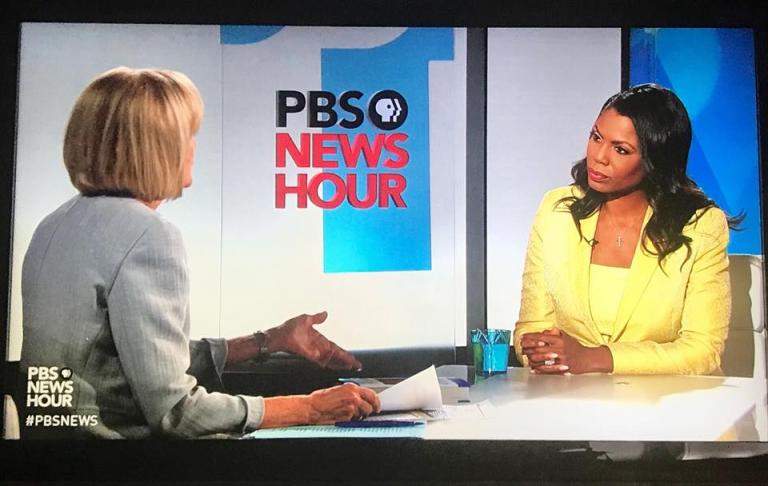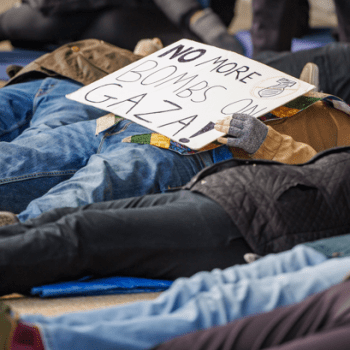He called her a dog.
The day after white supremacists tried to rally in our nation’s capital, the president—who some might call the most powerful white man in the world—called a black woman who used to work for him a “dog.” Right out loud. In public.
And just like every other day, we’re mostly going to sit here and be OK about it because it’s just another day in Trump’s America.
I preached a sermon on Sunday about the power of words. “Good words” and “bad words.” Kids have periods of discernment as they learn the language. They learn what words are acceptable where. They learn what words are getting bleeped out on TV, and what words are implied by those *%&#$@ symbols in their comic books.
They also learn (hopefully) that it’s not that simple. Language is complex, and with nuance, more complicated still. There are, as the scripture indicates, “words that build up,” and words that tear down. Sometimes the good words are hard to come by.

Sometimes the words that tear down are so carefully encrypted, they don’t even sound like bad words.
Last week, allegations emerged that Trump had used the N-word during his time on his television show The Apprentice, and that audio tapes were available to prove it. News outlets were reporting on this as though it were a “shocking revelation,” a bombshell the likes of which could end a presidency. But for most of us, it was anything but shocking. It was just another day in Trump’s America.
Which goes to show how quickly we get used to things. How quickly the abnormal becomes normal, and the deplorable becomes acceptable.
For the record, I can’t see how using the N-word is any worse than a white man calling a black woman a “dog.” The racist and sexist implications there are manifold, and they are clear. It’s a way of demeaning and demoralizing, dismissing and silencing. The word itself doesn’t matter: the intent is clear. The outrage should be the same, whether he said it outright in an audio tape or just cast the same sentiment into the ether with another moronic Tweet.
But, as we’ve learned—even audio tapes don’t matter. When it comes to holding him accountable for his words, nothing matters.
Which is why it’s important to remember that this is not about him. Yes, he has amplified and given voice to the ignorant racist dregs who’d been relegated to the shadows for the past few decades. Yes, he is a danger to himself and others and he needs to go on somewhere. But Trump didn’t invent racism. It didn’t start with him, and once we’re rid of him, it will still be here.
So what are WE, the people, going to do? How are we going to push back against this recent wave of racist empowerment? Maybe that’s the problem … We don’t know how to claim our own voice in this matter, so we don’t feel empowered to say anything. And if we decline to voice opposition, we become part of the problem. Our silence condones and creates space for evil to take root and thrive.
No more.
The first step is to acknowledge that we can’t fix centuries of systemic racism in a day. When we think that’s the goal, we get overwhelmed and ineffective. Instead, we need to find where we DO have power. Where we can use our privilege and speak with authority.
To that end: I’ve got a real-life lesson for you. Remember my friend Shawn, who wrote this great guest post last year? Check out this exchange that went down as he checked out of a hotel yesterday:
Receptionist: I hope you enjoyed your stay Mr. McGuffey and we hope to see you again.
Shawn: It was busy but I did enjoy my stay. Thank you.
Receptionist: Oh, I’m sorry, I meant Doctor McGuffey.
Shawn: (Laughing) No worries. It’s not that serious.
Receptionist: Yes, it is. The Klan and Nazis are marching across the country right now trying to take us backwards and shouting ‘Make America Great Again.’ As a White ally, acknowledging Black excellence in front of White people is part of my everyday resistance to White supremacy. So Dr. McGuffey, I hope you enjoyed your stay.
Me: Thank you. I see you and I sincerely appreciate you.
Dude. That is how it’s done. See how easy that was? It might not seem like much. But the smallest moments of recognition and awareness can have deep transformation potential.
When the Klan marches on Washington, every word matters. When the Klan marches on Washington, and the man in the White House uses words that affirm their agenda, then our own words matter more than ever. Watch for these moments and boldly step into them. Every day. Because our words matter more than ever. The “bad words” can be carefully hidden. Put the words that build up in plain sight.
















